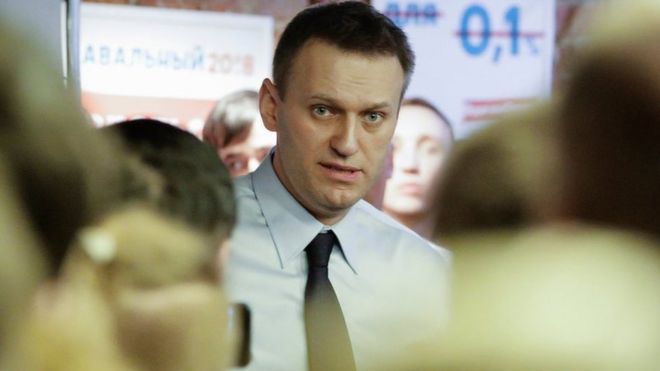 Russia's main opposition leader, Alexei Navalny, has been found guilty of embezzlement and handed a five-year suspended sentence.
Russia's main opposition leader, Alexei Navalny, has been found guilty of embezzlement and handed a five-year suspended sentence.It bars him from running for president next year against Vladimir Putin.
But Mr Navalny, who denies the charges, has vowed to take part in the race regardless. It was not immediately clear if this was legally possible.
His conviction came in a retrial after the European Court of Human Rights ruled the first trial to be unfair.
The court in the provincial city of Kirov found Mr Navalny guilty of embezzlement in relation to a timber company called Kirovles, for which he was also handed a 500,000-rouble ($8,500; £6,700) fine.
Navalny vows to fight on after verdict
Mr Navalny, 40, is known for his anti-corruption campaign, which targeted senior officials close to the Kremlin. He says the case against him is an effort to keep him out of politics.
He had recently stepped up his political activity after announcing plans last year to run for the presidency in 2018. Mr Putin is allowed by the constitution to run for a second consecutive six-year term, but he has not said yet if he plans to do so.
Mr Putin has already served three terms as president in total but just two of those consecutively.
Mr Navalny's rise as a force in Russian politics began in 2008 when he started blogging about alleged malpractice and corruption at some of Russia's big state-controlled corporations.
He described the president's United Russia as "the party of crooks and thieves", a phrase that appeared to resonate with many in Russia.
He stood for Moscow mayor in 2013 and got more than a quarter of the vote, a surprise to many.
Russia's vociferous opposition leader
The outspoken critic of President Putin said the sentence in the case, which he claims was politically motivated, was a sign that the Kremlin considered him to be too dangerous to take part in the election campaign. He has vowed to appeal against the verdict.
"We don't recognise this ruling. I have every right to take part in the election according to the constitution and I will do so. I will continue to represent the interests of people who want to see Russia a normal, honest and non-corrupt country," he told reporters after the judge announced the sentence.
But the legality of his candidacy is in question, as under Russian law anyone is banned from running for office for 10 years after being convicted of a serious crime. Separately, the constitution bans anyone from running who is physically in prison.
Mr Navalny was allowed to stand as a candidate for the mayoralty of Moscow despite his suspended sentence in 2013.
Kremlin spokesman Dmitry Peskov has dismissed concerns raised about Mr Navalny's absence undermining the legitimacy of the election.
"We believe any concerns about this are inappropriate," he said, speaking before the trial concluded.
Inside the court room - by Sarah Rainsford, BBC News, Kirov
It took the judge well over three hours to read his verdict to the stuffy courtroom - at a fast mumble and with the occasional deep sigh. Towards the end he knocked the microphone away, and from then on was barely audible at all. But his final, guilty decision - once confirmed - was no surprise.
Even before the hearing began, Alexei Navalny told me he wasn't expecting anything good to come of it. The activist insists that this whole case was meant to stop his corruption investigations and to ensure he had a serious criminal conviction to bar him from running for president. Mr Navalny plans to dispute that law as a violation of Russia's constitution.
What are the charges?
Mr Navalny has been convicted of embezzling timber worth 16m roubles ($500,000; £330,000) from the Kirovles state timber company while working as an adviser to Kirov's governor, Nikita Belykh.
It was a retrial of the original 2013 case - and another five-year suspended sentence - that was quashed by the European Court of Human Rights (ECHR), which said he was not given a fair hearing.
The ECHR also said the original trial had failed to address allegations that it was politically motivated.
At the time, the verdict was widely condemned by the European Union and the US, with opposition supporters clashing with police in Moscow, St Petersburg and other cities.
And last week, the ECHR ordered Russia to pay the leading opposition figure more than €63,000 (£54,000; $67,000) in compensation, saying his right to peaceful protest had been violated multiple times, in cases dating back to 2012.
At the start of the verdict on Wednesday, judge Alexei Vtyurin said the court had established that Mr Navalny had "organised" the theft.
Mr Navalny is likely to only serve 18 months of the five-year suspended sentence because the judge has taken into account time served from the previous sentence before the ECHR ruling, his lawyer told journalists.
Original Article
Source: BBC
Author: ---
No comments:
Post a Comment